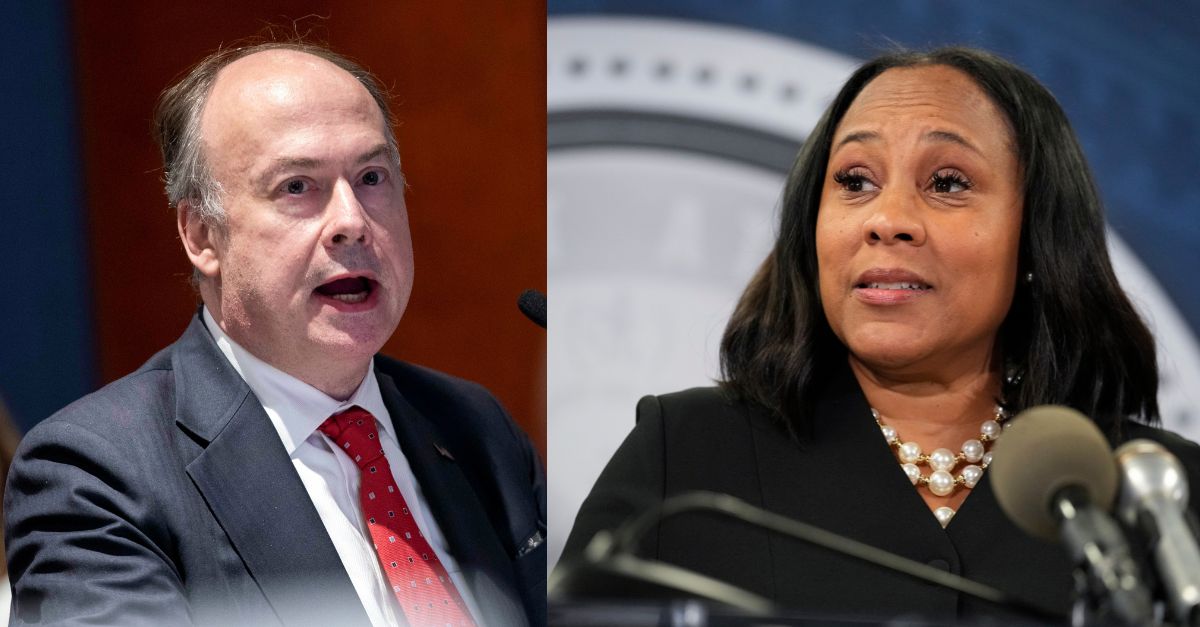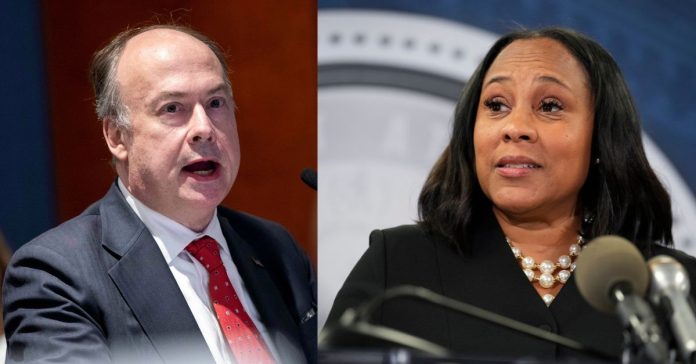
Left: Former Justice Department official Jeffrey Clark attends an event hosted by Rep. Matt Gaetz, R-Fla., at the Capitol in Washington on June 13, 2023. (AP Photo/Amanda Andrade-Rhoades) Right: Fulton County District Attorney Fani Willis speaks in the Fulton County Government Center during a news conference in Atlanta on Aug. 14, 2023. (AP Photo/John Bazemore)
Onetime U.S. Department of Justice attorney and Donald Trump ally Jeffrey Clark was denied a request to delay proceedings in his Georgia racketeering (RICO) and election subversion case earlier this week.
In a terse, one-sentence-long order dated Jan. 26, Fulton County Judge Scott McAfee denied Clark’s heavily redacted motion for an extension to file pretrial motions past the current deadline of Feb. 5.
“Having reviewed the unredacted version of Defendant Clark’s Motion for Further Extension of Motion Deadline, a redacted version of which was filed January 22, 2024,” the judge wrote, “the motion is denied.”
The publicly-available version of the Clark motion is not particularly illuminating. A three-page exhibit is attached, but each page is entirely blacked out by legal redaction software.
“As befits the former head of two litigating divisions of the Department of Justice, Mr. Clark is heavily involved in all elements of the defense in this case, including the preparation of legal filings,” the lengthiest legible portion of the motion reads. “[Redacted] significant impediment to his ability to assist in his own defense.”
Clark is an environmental lawyer whom Trump nearly tapped to be acting attorney general in his scramble to retain the presidency after losing to Joe Biden in the 2020 election. The defendant previously worked as an assistant attorney general at one sub-agency within the DOJ and an acting assistant attorney general within another.
A co-defendant along with the 45th president, Clark stands accused of two counts in the sprawling, 98-page, 41-count criminal indictment filed by Fulton County prosecutors in August 2023. Namely, one count of violating the Peach State’s homegrown RICO statute and one count of criminal attempt to commit false statements and writings.
The charges against Clark are based on an unsent draft letter falsely claiming the DOJ “identified significant concerns that may have impacted the outcome of the election in multiple states, including the state of Georgia.” Clark’s draft also called on officials to convene the state legislature and consider advancing a slate of contingent, or fake, electors committed to voting for Trump in the Electoral College.
Clark previously sought to have his state case removed to federal court. That effort was denied by a federal judge in September 2023.
Like many of his co-defendants, the embroiled attorney faces proceedings on several fronts over the election subversion matter.
The D.C. Bar Office of Disciplinary Counsel filed ethics charges against Clark in July 2022. Those proceedings were then paused for several months. Clark motioned to have the case against him removed to a federal court in October 2022. A federal judge denied that request in June 2023 by finding that federal courts have no jurisdiction over attorney licensing disputes. His disciplinary hearings were put back on track by an ethics official in November 2023 — citing “serial delay.”
The ex-president and likely GOP 2024 presidential nominee recently telegraphed his intent to interject himself into Clark’s D.C. ethics case — by way of a letter sent by Trump attorney Todd Blanche. In that letter sent to Clark, the former president aims to stop his onetime DOJ underling from sharing details of conversations they had in the waning days of the 45th presidential administration.
“In light of these circumstances and the pending D.C. Bar disciplinary proceeding against you, which is set to begin before Hearing Committee #12 on March 26, 2024,” the letter reads, “we hereby instruct you to maintain President Donald Trump’s executive privilege and other related privileges, including law enforcement privilege, attorney client privilege, and deliberative process privilege.”
Brandi Buchman and Marisa Sarnoff contributed to this report.
Have a tip we should know? [email protected]

